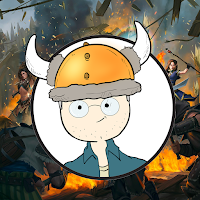Anyway, that roughly two-decade time period always fascinated me a bit because, like many of us, I'm at least a little bit of a history nerd, and in some ways I can mentally equate that time period to the typical OSR campaign setting.
Hear me out here.......clearly there isn't a direct connection, but I'm thinking the edge of civilization with plenty of open/wild lands around. You don't have to go too far to find danger. There is an increased level of technology and industrialization, but it isn't ever-present. In a land where there is one Doctor for the county, no paved roads, but there is a single narrow gauge railroad. There are still plenty of predators/wild animals about and mankind basically has small carved-out enclaves throughout the area (I think the county had 9 tiny townships).....this isn't too far off from the typical medieval fantasy world. Just replace the "technology" with "magic".
This rural county would be akin to a borderland state. There's a number of small churches, but only one Priest of middling level that can Cure or Heal. People live in small towns that are pretty much a half-day's ride away across minor trails. You can get some wonderous magic from the trader that comes into town once or twice a week, but there really isn't much more than a hedge-wizard around. People largely work the land, keep an eye out for danger from the woods, and are pretty insular when it comes to "others".
Now I'm not advocating for trying to game in an Age of Expansion America, but I am saying that there might be some value in seeing how people lived back then and using that info to influence the game world of your own campaign. I think for a lot of us that history might be a lot more approachable than say, picking up a book like Life in a Medieval Village. Of course that book might help to understand feudalism, but in a world of magic (both divine and arcane) I'm not sure how feudal we can go....of course, you do you.
I just think when you add in murderhobos, the magic, and the fantasy elements, this more American-history model makes a bit more sense than a strictly feudal setting.....
...anyway, this has been a long, rambling segue from my initial findings to something I think would add a lot to a typical campaign: "secret" societies. I was pretty much astonished by the numbers of these "secret" (it seemed like more than a few weren't actually secret, just pretended to be) organizations. Many were just fraternal organizations and if the numbers were to believed, most men belonged to at least two organizations, if not three.
It seemed like these organizations were anything from simple drinking clubs and mutual-aid societies to bonafide charities. There were some that overlap of members and others that by design had no overlap. Basically these were communities within-communities and served to connect people that might otherwise be separated (like Catholics and Protestants in highly religious communities). These groups would have regular meetings, special events, and would definitely form bonds between outwardly appearing disparate groups.
I like to think there could be a ton of role-play potential by using secret societies to connect the NPCs of your game world. The PCs could tick off one merchant and find out that a week later the fishmonger will no longer sell the party Mage that Giant Octopus Ink he needs for his scrolls. Why? Well those two are in the Fraternal Order of the Owlbear and that group decided "Eff those murderhoboes". There normally isn't too much of a goblin problem in the area, but lately there have been a periodic rash of break-ins and thefts attributed to the creature...
....Well there is this secret society that holds ritualistic goblin hunts and they have had to import goblins, set them loose, and then track them down for the hunt. The goblins are trying to do resource grabs so they can flee. It's a bit of a mess, but those guys throw one mean party every other month or so....
Those are just two quick ideas, but when I start up a new campaign or introduce a new town I like to think that the world doesn't revolve around the PCs and adding bits of lore that clearly exists without PC input makes that work better. This is why I like to have an established game calendar. I can set certain events, like normal society meetings or special events and if the party is in the right place at the right time, good for them. If not, well maybe that fishmonger and merchant have something cool from last night's event to be talking about...



There was, upon a time, a lot of ink and later pixels spilled over the idea that Gary's fantasy settings were more Wild West in nature than they were truly medieval. There is much to the idea, as the default setting, titles and whatnot aside, wasn't remotely feudal in nature, but in fact, much more echoed the culture of Colonial America or the later Wild West period (or rather, even then, the idealized versions of literature and dime novels).
ReplyDeleteYou can still find some such discussion on old blogs and boards, and if course, the Wampus County blog is a living, breathing exemplar of the theme taken to its ultimate conclusion.